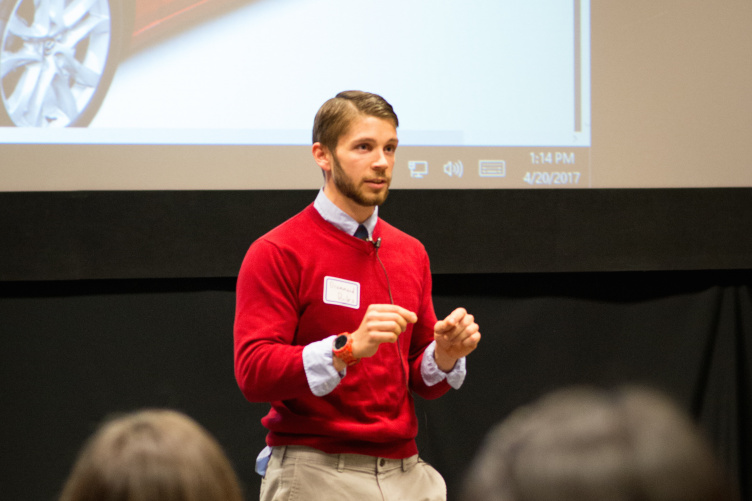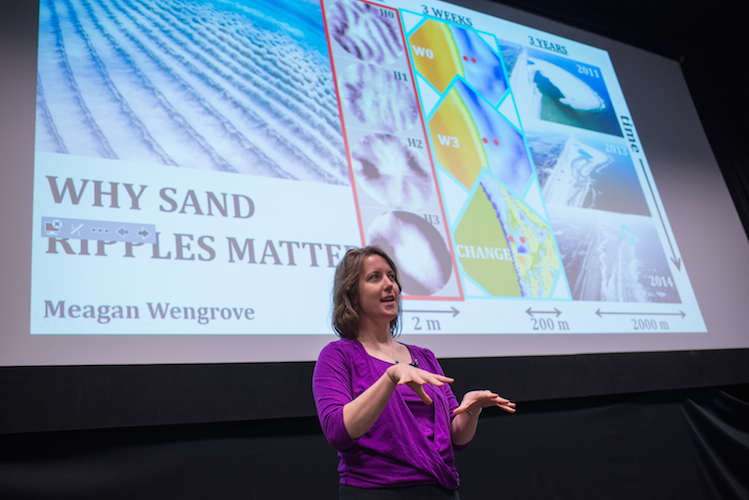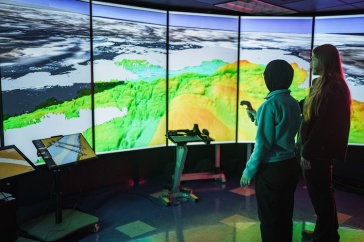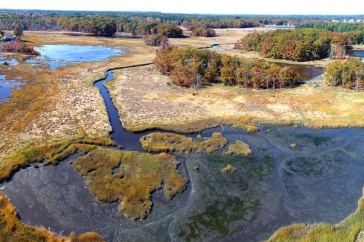
Mechanical engineering Ph.D. student Drummond Biles won UNH’s 3 Minute Thesis Competition; second place went to Meagan Wengrove (Ph.D., ocean engineering); third to Ryan Stevens (Ph.D., natural resources); and people’s choice to Rev. Holland Prior (MFA, creative nonfiction). (Photo of Drummond Biles by Scott Ripley.)
Graduate students spend years toiling over their research; their dissertations can run hundreds of pages. But over the past few weeks, dozens of UNH graduate students took on what might have been the biggest challenge of their academic careers to date: They described their research in lay terms in just three minutes.
These brave students were participants in UNH’s second annual 3 Minute Thesis competition, a worldwide event that challenges them to engage an audience and convey the impact of their work — fast, and with just one static slide. “No bells and whistles,” said interim dean of the graduate school Cari Moorhead in her introduction of the final round of competition last week (April 26, 2017). “They can’t sing, they can’t dance, they can’t rap. Some of them were tempted.”

Resisting that temptation through two rounds of competition, mechanical engineering Ph.D. student Drummond Biles took the top honor for his cogent explanation of thermal efficiency in automobiles. Modern cars, he said, lose up to 30 percent of the energy from gasoline to the colder metal surrounding the engine. Connecting the concept to his audience’s lives, he translated that energy loss to 68 million gallons of gasoline just from commuting, or “250 times the volume of this theatre here.” His research aims to understand how that heat gets lost, leading to greater fuel efficiency in vehicles.
Meagan Wengrove’s investigation into sand ripples and coastal change earned her second place. A Ph.D. student in ocean engineering, Wengrove showed how ripples that began at just centimeters were responsible for moving 600 wheelbarrows of sand in one day. “This matters because we care about our coasts, we care about the people who live near our coasts,” she said. “If we can better understand the physics of how ripples change then we can better estimate how our coast will change with storms into the future.”
Ryan Stephens’s work on how small mammals pollinate forests won third place — and identified five new species of New England truffles. Our forests face pressure from climate change, invasive insect species and timber harvests, Stephens said, so he’s exploring ways that small mammals, “the foodies of the forest,” can make our forests more resilient.
“This is more about communication than it is about research.” — Cari Moorhead, interim dean of the graduate school
The Ph.D. student in natural resources explained how many tree species depend on a diversity of mycorrhizal fungi; truffles are the underground fruit of these fungi. “For the same reason people spend $3,000 for one pound of truffles, small mammals find these truffles and eat them as a major part of their food source,” he said, and disperse their spores — up to one billion of them in a single gram of poop. When an audience member asked him about his truffle-collecting methods, Stephens quipped that pigs and dogs are traditional truffle-hunters, “but we can’t afford them so we use undergraduates.”
The people’s choice award went to Reverend Holland Prior, pursuing a Master of Fine Arts in nonfiction writing, for her work on the rise and fall of women in the American clergy. Jovana Milosavljevic Ardeljan, a Ph.D. student in education, was runner-up for her research on how graduate students can develop communication skills.
Developing those communications skills is a goal of the 3 Minute Thesis competition, Moorhead said. “Our students are learning to think about their research in ways they may not have previously done,” she said. “This is more about communication than it is about research.”
Watch Drummond Biles' 3 Minute Thesis here.
Find videos of all the 3 Minute Thesis competitors here.
-
Written By:
Beth Potier | UNH Marketing | beth.potier@unh.edu | 2-1566
















































